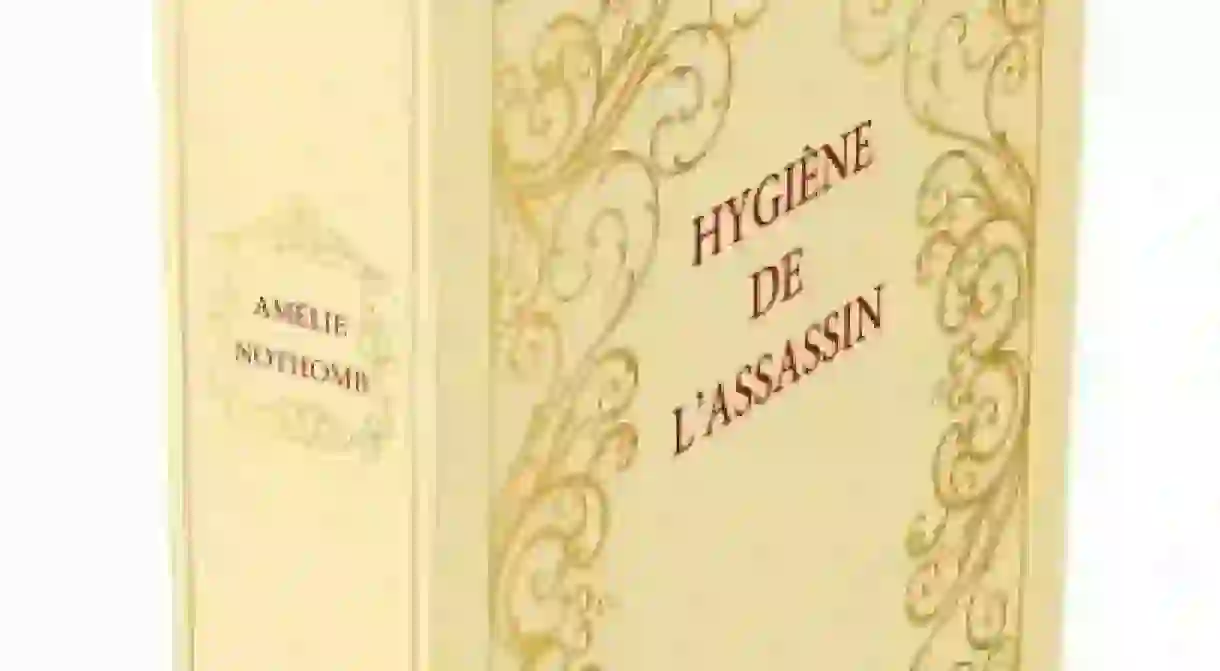How Amélie Nothomb Became Belgium's Most Outlandish Writer

For a country as small as Belgium, having an international writer is by itself an achievement, let alone a best-seller like Amélie Nothomb. Throughout the years, the mysterious writer has created a real-life character of her own; her image is spread all over the press and tales about her biography proliferate.

In 1992, 25-year-old Belgian writer Amélie Nothomb published her first novel, which would become an instant success. Hygiene And The Assassin is about an old, obese, dying Nobel Prize-winning writer, who is solicited by countless journalists when they hear that he only has two months left to live and are, therefore, expecting to get one last, big interview. But, by the power of his mordacious speech, the mean old man tortures the journalists — all inexperienced, naïve and poorly prepared — one after the other. It is only then that a woman, Nina, enters the scene. She will be his nemesis and will challenge him into a duel where the word is a deadly weapon.
The fact that a woman should succeed where many men have failed — attention being brought to her gender and the implication that it is somehow related to her success — is a cliché. But if we can get past that, after reading this novel, one thing can easily be concluded: Nothomb is a wonderful plotter. This, accompanied by the fluidity of the prose, might just be the key ingredient that makes her a best-selling author.
The story, in this case, is fortified by the strength of the dialogue, which overtakes most of the action and is powerful enough to subsist almost independently without the narrative. The latter, though, left to its subsidiary role, tends to resemble stage directions and is therefore a bit awkward.
The main character is well built. He proves to be cruel and quite grotesque yet sympathetic at the same time. He somehow represents the social outcast or the artist who lives independently from the world, who we all sometimes — even if secretly — would like to be. This is generally what tends to happen in Nothomb’s novels: the energy is almost all directed towards one strong main character, while she seems to forget to give the other characters any peculiarity, making them rather two-dimensional.

Hygiene and the Assassin is a good example of the hypothesis that Nothomb has the qualities and defects of a commercial author writing for a big audience: good plot, complete characters but also dangerously approaching the cliché with regularity, as some critics would say. The simplistic style that makes it very easy to read can also make it literarily plain, lacking the details that constitute excellence.
To fully understand Nothomb’s work, though, we have to look into her childhood. Being the daughter of a Belgian diplomat, she spent the first years of her life in the beautiful outskirts of Kobe, Japan. The experience is extensively described in The Life of Hunger, a semi-autobiographical narrative in which she portrays the life of a girl whose world was revolutionized every three years by moving to different countries and therefore, worlds.
The hardest to leave behind was Japan — a land of abundance where nature could be observed in its purest form and a land of tranquillity where everything was loving — especially when she found herself in the arms of her nanny, Nishio-san. In contrast, she then moved, in 1972, to China. ‘My world was inhabited by birds and monkeys — she says — by fish and squirrels, each one free in the fluidity of its space. In Beijing, all the animals were prisoners: donkeys heavily loaded, horses firmly attached to enormous carriages, pigs that read their soon-to-come death in the eyes of a starving population to whom we weren’t allowed to say a word.’
Later, she lived in New York, Bangladesh and Burma, but Japan was the one place that haunted her mind, to the point that she returned there as a young adult. After finishing her studies in Brussels in 1990, she moved to Tokyo in order to work as a translator for a big company. ‘I had gone there to reconnect with the paradise of my childhood,’ she says in a documentary called Amélie Nothomb, A Life Between Two Waters, ‘and what I found was the inferno of Tokyo’s professional life.’ The experience wasn’t what she expected, and using it as inspiration, she published the novel Fear and Trembling, a story of a young Amélie who sees herself being constantly tortured by her superiors who are representatives of a ruthless work society where the self is negated and who thrives on humiliating and degrading others.

If Japanese men have it hard, as they are obligated to forget their dreams in pursuit of the ever-nonexistent ideal of perfection, then the only honorable way out for women seems to be suicide.
This book allowed Nothomb to achieve notoriety, by winning the Grand Prix du Roman de L’Académie Française, thus making her gain literary prestige on top of her already immense popularity. It was also turned into a quite successful film.
Read by millions of people, she pays very close attention to her fans and spends hours every day answering their mail. Her eccentric image — big hat, black hair, strong red lips — is almost like a brand and grabs the public eye to the point of controversy. The latest extends to her name (she was born Fabienne), and to the information she presents as biographical but are, by many, denounced as pure fantasies and lies. Many believe, for example, that she was not born in Japan as she claims but in Etterbeek, Brussels.
The opinion is divided: this can either be seen as an idea of genius, by which the writer becomes a real life character herself, or a fraud that violates the relationship of trust between the writer and the reader. All controversies aside, one thing is certain: the woman is a long-lasting success.














